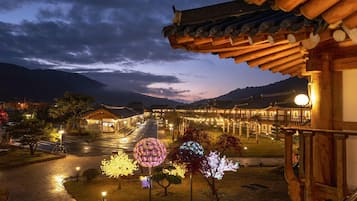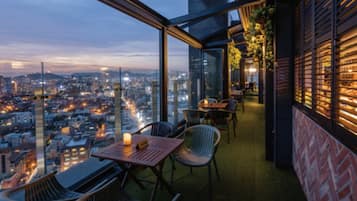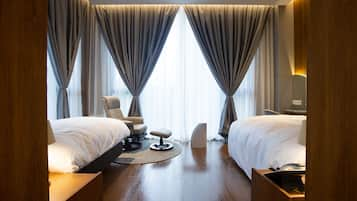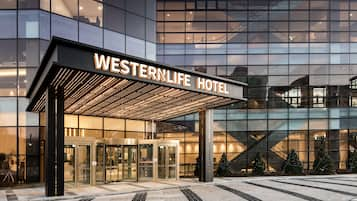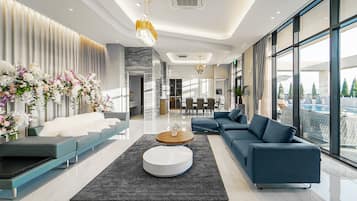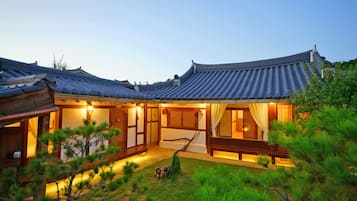Looking for fun things to do after dinner in Jeonju? Night-time activities range from low-key ventures like viewing historical monuments to visiting traditional markets, all of which provide a sensory experience and insight into the local culture.
After you’ve enjoyed your dinner, come along with us, stretch your legs and see what exciting adventures await you after sunset in Jeonju. You’ll discover another side of this dynamic culinary and cultural hub. Read on for our favourite places to go in Jeonju at night.
- 1
Nambu Market
Traditional marketplace dating back to 1905

- Budget
- Gastronomie
- Vie nocturne
- Magasinage
Nambu Market has been an important gathering point for locals since 1905. The centrally located market is great for getting desserts or snacks after dinner in Jeonju. You can also purchase souvenirs, hand-crafted gifts, fresh produce, household items, and Korean street food.
If you visit the market at the right time, live music and cultural performances add to the festive ambience. The ground-floor shops and stalls of Nambu Market offer local food and beverages. The upper floor hosts eclectic bars and restaurants, as well as local businesses specialising in homemade arts and crafts.
Lieu : 19-3 Pungnammun 1-gil, Wansan-gu, Jeonju-si, Jeollabuk-do, South Korea
Heures d’ouverture : Daily from 9.30 am to 10 pm
Téléphone : +82 (0)63 248 1344
Carte - 2
Jeonju Hanok Village
Take a step back in time when you visit this unique village

- Budget
- Histoire
- Vie nocturne
- Photographie
The hundreds of hanok (traditional Korean houses) in Jeonju Hanok Village were designed to provide a living experience that is in harmony with nature. Built using natural materials like wood, stone, and clay, the distinctive architecture is evocative and pleasing to the eye.
Strolling through this village on cobblestone streets feels as if you’ve been transported to a bygone era. The houses have been transformed into craft workshops, teahouses, eateries, boutiques, and museums. If you want a truly exceptional experience, you can stay at one of the many guesthouses in the village.
Lieu : 99 Girin-daero, Pungnamdong 3(sam)-ga, Wansan-gu, Jeonju-si, Jeollabuk-do, South Korea
Téléphone : +82 (0)63 282 1330
Carte - 3
Omokdae
Fantastic twilight views from an ornate monument

- Budget
- Histoire
- Vie nocturne
- Photographie
Omokdae is an elaborately embellished pavilion in Jeonju. It commemorates the spot where Yi Seong-gye (first ruler of the Joseon Dynasty) celebrated his victory against the Japanese in 1380. The distinctive slate rooftops, which gracefully arch towards the sky, harken back to the past.
Set against the modern backdrop of Jeonju, the pavilion is especially spectacular after sunset. Its detailed architectural features are well-lit, and there are panoramic views of Jeonju Hanok Village and the city’s twinkling lights as you make your way up the hill.
Lieu : 55 Girin-daero, Wansan-gu, Jeonju-si, Jeollabuk-do, South Korea
Téléphone : +82 (0)63 232 2255
Carte - 4
Jaman Mural Village
An eclectic enclave of colourful murals at the foot of Seungamsan Mountain

- Budget
- Histoire
- Vie nocturne
- Photographie
Jaman Mural Village is a kaleidoscope of colour splashed on the sides of homes and along the winding streets and alleys. A visit to this funky little neighbourhood will show you a wealth of vibrant local street art. Follow the looped path to explore the many murals – be sure to look over your shoulder as there are excellent night views of the city, too.
Mural villages are very popular in South Korea as these picturesque settings revitalise and beautify neighbourhoods. They also instil a sense of community and pride among the residents. Jaman Mural Village is an excellent example of breathing new life into these areas.
CartePhoto prise par Sharon Hahn Darlin (CC BY 2.0) modifiée
- 5
Pungnammun Gate
Visit this architectural treasure after dark for a spectacular view

- Budget
- Histoire
- Vie nocturne
- Photographie
Pungnammun Gate is the last remaining fortress gate that protected Jeonju from invaders in the past. It stands sentinel over the city, and has been designated a Korean historical architectural monument.
The massive gate is impressive any time of the day, but viewing it after you’ve had your evening meal offers a unique night-time perspective. It is well lit, with the roof’s graceful and ornate details standing out against the dark sky. An onsite plaque describes the history of Pungnammun Gate. It’s worth reading for a better understanding of this distinctive memorial.
Lieu : 1 Pungnammun3(sam)-gil, Wansan-gu, Jeonju-si, Jeollabuk-do, South Korea
Carte - 6
Gyeonggijeon Shrine
An ancient and venerated shrine in Jeonju

- Budget
- Histoire
- Vie nocturne
- Photographie
Gyeonggijeon Shrine, established in 1410, is famous for displaying King Taejo’s royal portrait. The compound also hosts the Royal Portrait Museum and various exhibits. The many intricate structures inside the shrine provide a tranquil reprieve and informative journey into the country’s rich history and culture.
Gyeonggijeon Shrine is located in Jeonju Hanok Village, where many restaurants serve authentic Korean dishes throughout the day. As it closes at 8 pm, you can explore its many installations and exhibits after dinner.
Lieu : 44 Taejo-ro, Wansan-gu, Jeonju-si, Jeollabuk-do, South Korea
Heures d’ouverture : Daily from 9 am to 8 pm
Téléphone : +82 (0)63 287 1330
Carte - 7
Gaeksa
A flourishing and fun neighbourhood located near a historical landmark

- Gastronomie
- Histoire
- Vie nocturne
- Photographie
- Magasinage
Gaeksa is a hip neighbourhood named after a former government office building in Jeonju. You can find many shops, restaurants, bars, and cafés surrounding the centrally located traditional structure – Jeonju Pungpaejigwan.
You can explore the building for free, but most visitors are drawn to Gaeksa’s diverse shopping and dining opportunities. It’s an intriguing place to explore after dinner – you can enjoy traditional Korean desserts and late-night drinks with friendly locals. A night out in Gaeksa is a great way to experience modern Korean culture.
CartePhoto prise par Shamus7792003 (CC BY-SA 4.0) modifiée
- 8
Hanbyeokdang Pavilion
A relaxing open-air shelter with river views

- Budget
- Histoire
- Vie nocturne
- Photographie
Hanbyeokdang Pavilion sits at the foot of Seunggamsan Mountain, overlooking the Jeonjucheon River. The decorative structure has long beckoned poets and writers seeking inspiration from nature since 1404. Today, it offers a serene setting away from the hubbub of the city.
This colourful pavilion is set on the side of a steep hill, with stone steps leading you directly to the structure. Once you’ve reached the top, you can relax and commune with nature. One of the reasons writers were drawn to this spot is that, at times, the mist from Seunggamsan Mountain gives it an ethereal ambience.
Lieu : 15 Gyo-dong, Wansan-gu, Jeonju-si, Jeollabuk-do, South Korea
CartePhoto prise par Republic of Korea (CC BY-SA 2.0) modifiée
- 9
Hyoja Bridge
City lights are always more spectacular when reflected in the water

- Budget
- Vie nocturne
- Photographie
Hyoja Bridge connects the old city of Jeonju with the developed district of Sinsigaji. When the sun sets, the structure lights up and its brilliant reflection and twinkling city lights reflect against the Samchunchun River.
This dazzling view can be appreciated any time of the day. However, the best time to visit is after dinner, as you can walk or bike along the riverfront paths and walkways.
Carte - 10
Dong-Gosa Temple
For some of the best evening views of Jeonju
- Budget
- Histoire
- Vie nocturne
- Photographie
Dong-Gosa Temple offers spectacular sunset and night vistas of Jeonju. It’s easily spotted thanks to a white statue of Lord Maitreya Buddha. You can either hike or drive to catch the breathtaking views. While you’re at it, stroll around and visit the shrines and structures that dot the temple grounds.
The best time to visit the temple is when the sun begins to dip below the horizon. However, you can still enjoy great views of Jeonju if you head there after dinner. Dong-Gosa Temple is close to several notable landmarks, including the National Intangible Heritage Center, Jeonju Hanbyuk Cultural Center, and Jeonju Eco Museum.
Lieu : 10-88 Gyo-dong, Wansan-gu, Jeonju-si, Jeollabuk-do, South Korea
Téléphone : +82 (0)63 822 1626
Carte








